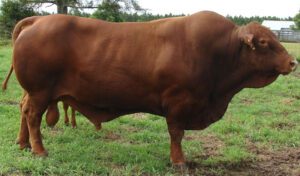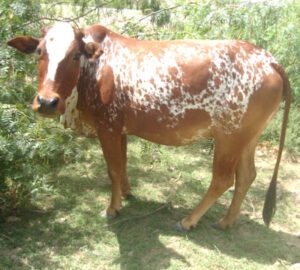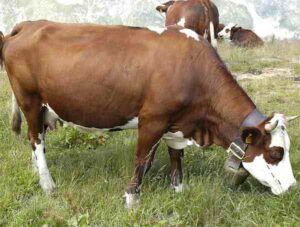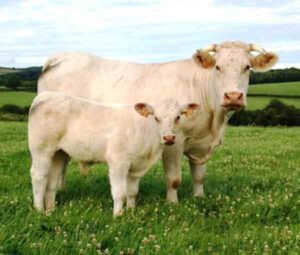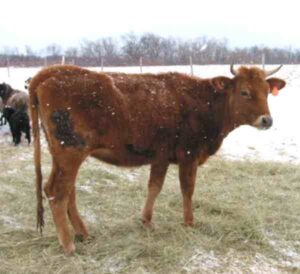The Pinzgauer cattle are a dual-purpose breed of domestic cattle which is mainly used for milk and meat production. The breed is from the Pinzgau region of the federal state of Salzburg in Austria.
Pinzgauer cattle were a triple-purpose breed in the past and also used for draught purposes. In 2007 the breed was not considered by the FAO to be at risk.
The Pinzgauer cattle are most closely related to North German lowland breeds (according to genetic and morphological studies). In the year of 1846, these animals were first referred to as a separate breed. It was bred into strong stock for work on farms in the 19th century.
And during that time the breed became the most popular breed of cattle for agricultural work in Austria and Hungary and some other parts of Eastern Europe.
In the year of 1896, the Bavarian Pinzgauer Cattle Breeding Association was founded. After the mechanization of agriculture, demand for the cattle decreased. And the breed then used for producing milk or meat.
There is a naturally polled sub-type available which is known as Jochberg Hummel. This sub-type was considered as a separate breed until 1997, and then it was merged into the Pinzgauer herdbook.
Jochberg Hummel cattle breed descend from a single, almost totally white calf that was born in 1834 in Tyrol. However, the Pinzgauer cattle are currently available in many countries of the world.
They are available in the United States, United Kingdom, Ukraine, South Africa, Romania, Namibia, Italy, Honduras, Germany, Brazil, Botswana and Australia.
Pinzgauer Cattle Characteristics
The Pinzgauer cattle are medium to large sized animals and they are auburn in color. Black animals have occurred, but rarely, and were once seen as a curse.
The black color vanished after 1900 when black bulls were removed from the breeding system. All the animals have the typical finched pattern in common with a broad white stripe lengthwise along the whole back.
Their udder, chest, tail and abdomen are of white color as well. They can be either horned or polled. They have smooth hair and firm and flexible skin that helps them to prevent tick and other insect infestations.
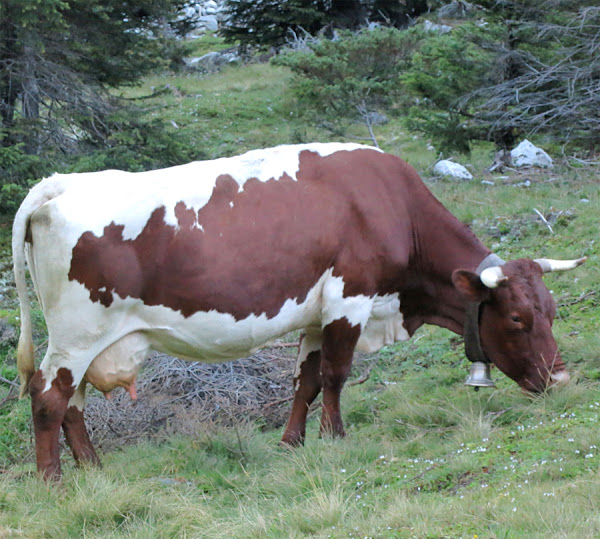
Average height of the bulls is about 147 cm at the withers and 137 cm for the cows. Average live body weight of the cows ranges from 600-700 kg. And the bulls on average weight about 1000 to 1100 kg. Photo and info from Wikipedia.
Uses
Pinzgauer cattle are dual-purpose animals. And they are mainly used for milk and meat production. But they were also used for draught purposes in the past. Their milk and meat are of good quality.
Special Notes
The Pinzgauer cattle are hardy and strong animals. They adapt readily and easily to a variety of climates. They are relatively calm and docile in temperament, and are noted for their feed efficiency, fertility and disease resistant capabilities.
The cows are usually great mothers and they will aggressively protect their calves. The cows calve easily and the calves have a rapid growth rate.
Milk of the Pinzgauer cattle is of good quality with 3.89 percent fat and 3.28 percent protein. On an average a cow can produce 4,000 to 5,000 kg of milk per lactation.
Meat of the Pinzgauer cattle is also of good quality. However, review full breed profile of the Pinzgauer cattle in the chart below.
| Breed Name | Pinzgauer | |
| Other Name | Pinzgau, Jocherg Hummel | |
| Breed Purpose | Milk, Meat and also for draught | |
| Special Notes | Strong, hardy, well adapted to a variety of climates | |
| Breed Size | Medium to large | |
| Bulls | About 1000 to 1100 kg | |
| Cows | About 600 to 700 kg | |
| Climate Tolerance | All Climates | |
| Coat Color | Auburn | |
| Horned | Yes/polled | |
| Milk Yield | Good | |
| Rarity | Common | |
| Country/Place of Origin | Austria |

